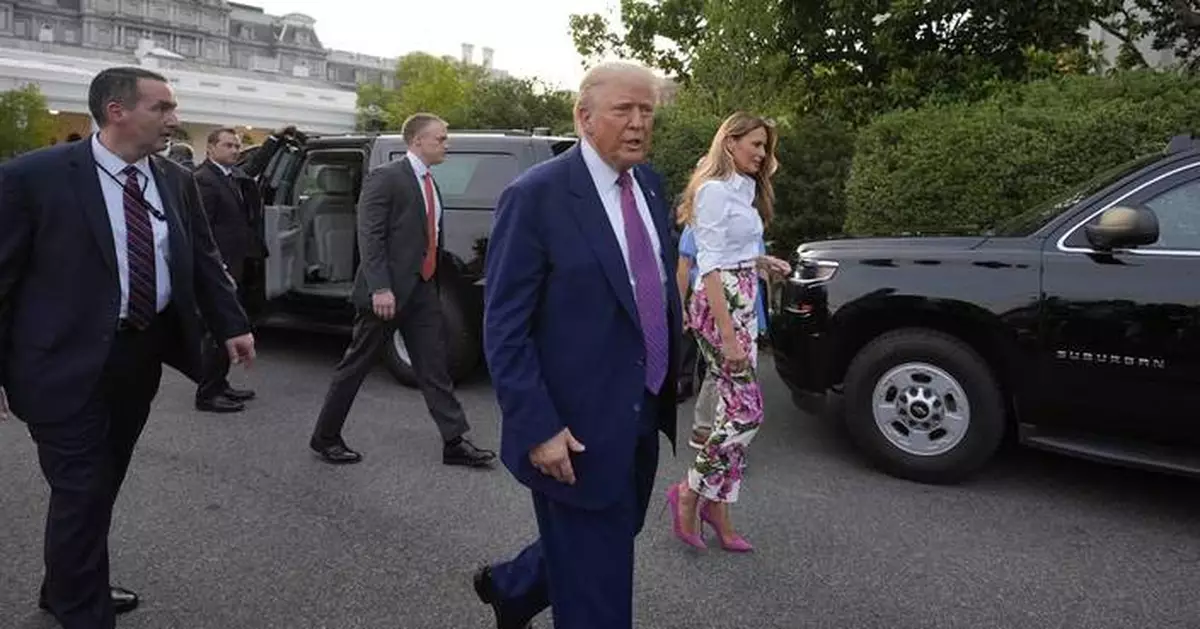WASHINGTON (AP) — President Donald Trump on Friday urged Iran to quickly reach an agreement on curbing its nuclear program as Israel vowed to continue its bombardment of the country.
Trump framed the volatile moment in the Middle East as a possible "second chance” for Iran's leadership to avoid further destruction "before there is nothing left and save what was once known as the Iranian Empire.”
Click to Gallery
Israel's Prime Minister Benjamin Netanyahu delivers a welcome message during a visit by Argentina's President Javier Milei to the Knesset, Israel's parliament, in Jerusalem, Wednesday, June 11, 2025. (AP Photo/Ohad Zwigenberg)
This photo released by an official website of the office of the Iranian supreme leader, shows Supreme Leader Ayatollah Ali Khamenei in a televised speech, under a portrait of the late revolutionary founder Ayatollah Khomeini, Friday, June 13, 2025. (Office of the Iranian Supreme Leader via AP)
President Donald Trump speaks during the congressional picnic on the South Lawn of the White House, Thursday, June 12, 2025, in Washington. (AP Photo/Alex Brandon)
President Donald Trump and first lady Melania Trump walk after greeting guests during the congressional picnic on the South Lawn of the White House, Thursday, June 12, 2025, in Washington. (AP Photo/Alex Brandon)
The Republican president pressed on Iran as he met his national security team in the Situation Room to discuss the tricky path forward following Israel's devastating strikes, which Prime Minister Benjamin Netanyahu pledged to keep up for “as many days as it takes” to decapitate Iran's nuclear program.
The White House said it had no involvement in the strikes, but Trump highlighted that Israel used its deep arsenal of weaponry provided by the U.S. to target Iran’s main enrichment facility in Natanz and the country’s ballistic missile program, as well as top nuclear scientists and officials.
Trump said on his Truth Social platform that he had warned Iran's leaders that “it would be much worse than anything they know, anticipated, or were told, that the United States makes the best and most lethal military equipment anywhere in the World, BY FAR, and that Israel has a lot of it, with much more to come - And they know how to use it."
Just hours before Israel launched its strikes on Iran early Friday, Trump was still holding onto tattered threads of hope that the long-simmering dispute could be resolved without military action. Now, he'll be tested anew on his ability to make good on a campaign promise to disentangle the U.S. from foreign conflicts.
In the aftermath of the Israeli strikes, the U.S. is shifting its military resources, including ships, in the Middle East as it looks to guard against possible retaliatory attacks by Tehran, according to two U.S. officials who spoke on the condition of anonymity to discuss sensitive matters.
The Navy has directed the destroyer USS Thomas Hudner to begin sailing toward the Eastern Mediterranean and has directed a second destroyer to begin moving forward, so it can be available if requested by the White House.
As Israel stepped up planning for strikes in recent weeks, Iran had signaled the United States would be held responsible in the event of an Israeli attack. The warning was issued by Iranian Foreign Minister Abbas Araghchi even as he engaged in talks with Trump special envoy Steve Witkoff over Tehran's rapidly advancing nuclear program.
Friday's strikes came as Trump planned to dispatch Witkoff to Oman on Sunday for the next round of talks with the Iranian foreign minister.
Witkoff still plans to go to Oman this weekend for talks on Tehran’s nuclear program, but it’s unclear if the Iranians will participate, according to U.S. officials who spoke on the condition of anonymity to describe private diplomatic discussions.
The president made a series of phone calls Friday to U.S. television news anchors to renew his calls on Iran to curb its nuclear program.
CNN's Dana Bash said Trump told her the Iranians “should now come to the table" and get a deal done. And Trump told NBC News that Iranian officials are “calling me to speak" but didn't provide further detail.
Trump also spoke Friday with British Prime Keir Starmer and French President Emmanuel Macron about the evolving situation, as well as Netanyahu.
Meanwhile, oil prices leapt and stocks fell on worries that the escalating violence could impact the flow of crude around the world, along with the global economy.
Sen. Tim Kaine, D-Va., offered rare words of Democratic praise for the Trump administration after the attack “for prioritizing diplomacy” and “refraining from participating" in the military strikes. But he also expressed deep concern about what the Israeli strikes could mean for U.S. personnel in the region.
Pennsylvania Gov. Josh Shapiro, who's on Democrats’ shortlist for top 2028 White House contenders, said if Israel can set back Iran's nuclear program with the strikes “it’s probably a good day for the world.”
“But make no mistake: We do not want an all-out war in the Middle East," Shapiro said. "That’s not only bad for the Middle East, it’s destabilizing for the globe, and it’s something that I hope will not occur.”
Israel launched blistering attacks on the heart of Iran’s nuclear and military structure Friday, deploying warplanes and drones previously smuggled into the country to assault key facilities and kill top generals and scientists — a barrage it said was necessary before its adversary got any closer to building an atomic weapon.
Iran retaliated by unleashing scores of ballistic missiles on Israel, where explosions flared in the skies over Jerusalem and Tel Aviv and shook the buildings below. The U.S. military assisted Israel intercept the missiles fired by Iran in the retaliatory attack.
Trump, in the hours before the Israeli attack on Iran, still appeared hopeful in public comments that there would be more time for diplomacy.
But it was clear to the administration that Israel was edging toward taking military action against Iran. The State Department and U.S. military on Wednesday directed a voluntary evacuation of nonessential personnel and their loved ones from some U.S. diplomatic outposts in the Middle East.
Before Israel launched the strikes, some of Trump's strongest supporters were raising concerns about what another expansive conflict in the Mideast could mean for the Republican president, who ran on a promise to quickly end the brutal wars in Gaza and Ukraine.
Trump has struggled to find an endgame to either of those conflicts and to make good on two of his biggest foreign policy campaign promises.
And after criticizing President Joe Biden during last year’s campaign for preventing Israel from carrying out strikes on Iranian nuclear sites, Trump found himself making the case to the Israelis to give diplomacy a chance.
The push by the Trump administration to persuade Tehran to give up its nuclear program came after the U.S. and other world powers in 2015 reached a long-term, comprehensive nuclear agreement that limited Tehran’s enrichment of uranium in exchange for the lifting of economic sanctions.
But Trump unilaterally withdrew the U.S. from the Obama administration-brokered agreement in 2018, calling it the “worst deal ever.”
The way forward is even more clouded now.
“No issue currently divides the right as much as foreign policy,” Charlie Kirk, the founder of Turning Point USA and an ally of the Trump White House, posted on X on Thursday. “I’m very concerned based on (everything) I’ve seen in the grassroots the last few months that this will cause a massive schism in MAGA and potentially disrupt our momentum and our insanely successful Presidency.”
AP writers Tara Copp, Seung Min Kim, Matthew Lee, Lisa Mascaro, Chris Megerian, Noah Trister in Oakmont, Pennsylvania, and Jon Gambrell in Dubai, United Arab Emirates, contributed reporting.
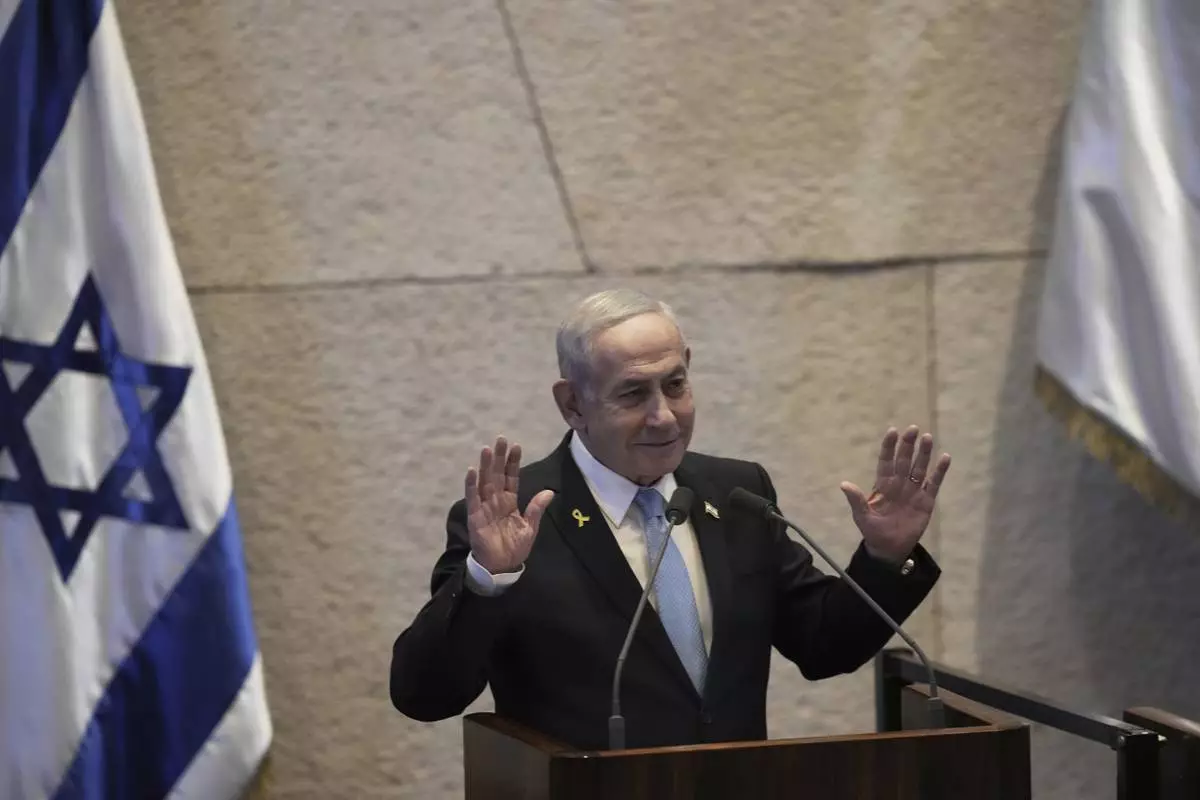
Israel's Prime Minister Benjamin Netanyahu delivers a welcome message during a visit by Argentina's President Javier Milei to the Knesset, Israel's parliament, in Jerusalem, Wednesday, June 11, 2025. (AP Photo/Ohad Zwigenberg)
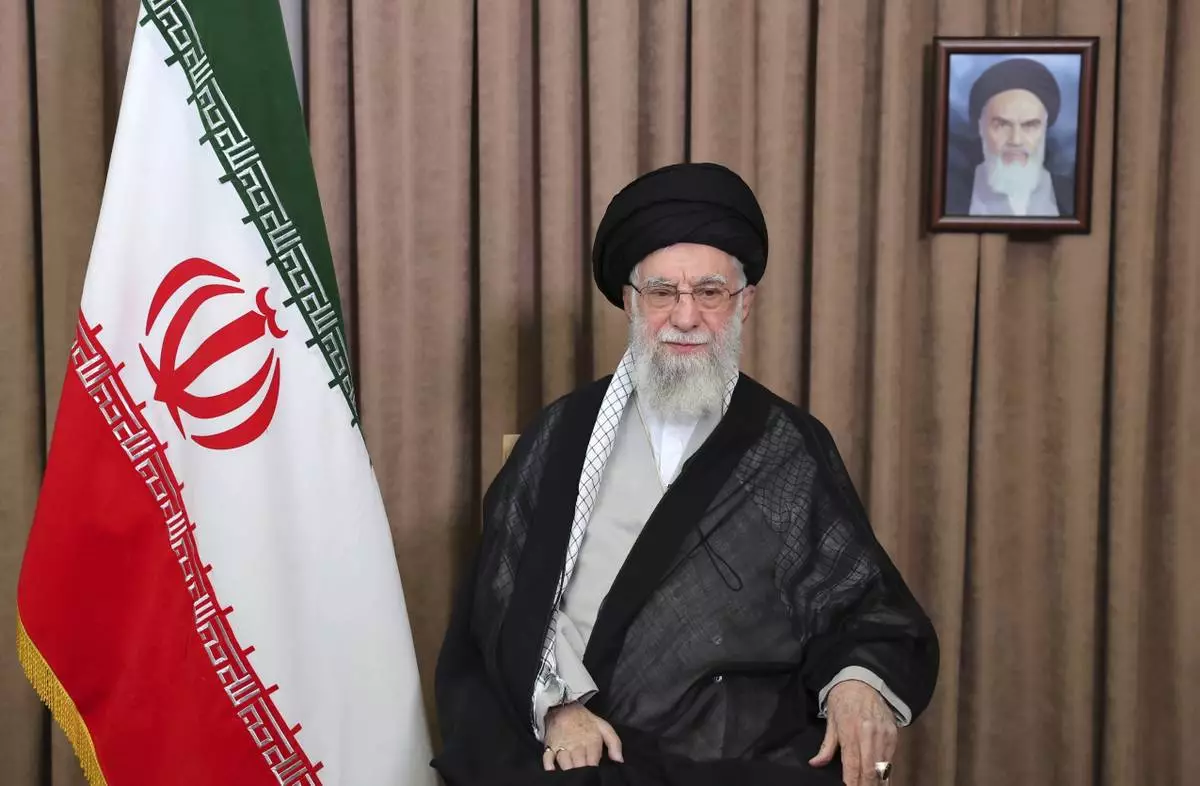
This photo released by an official website of the office of the Iranian supreme leader, shows Supreme Leader Ayatollah Ali Khamenei in a televised speech, under a portrait of the late revolutionary founder Ayatollah Khomeini, Friday, June 13, 2025. (Office of the Iranian Supreme Leader via AP)
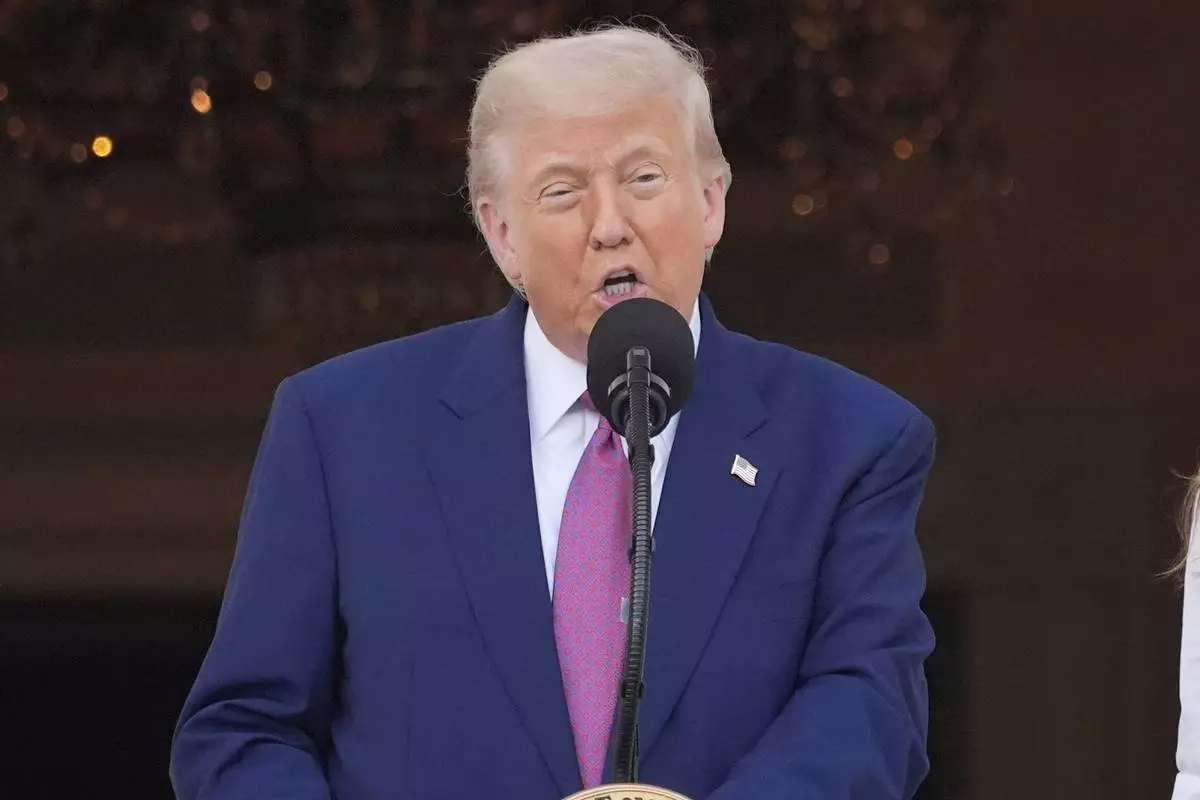
President Donald Trump speaks during the congressional picnic on the South Lawn of the White House, Thursday, June 12, 2025, in Washington. (AP Photo/Alex Brandon)
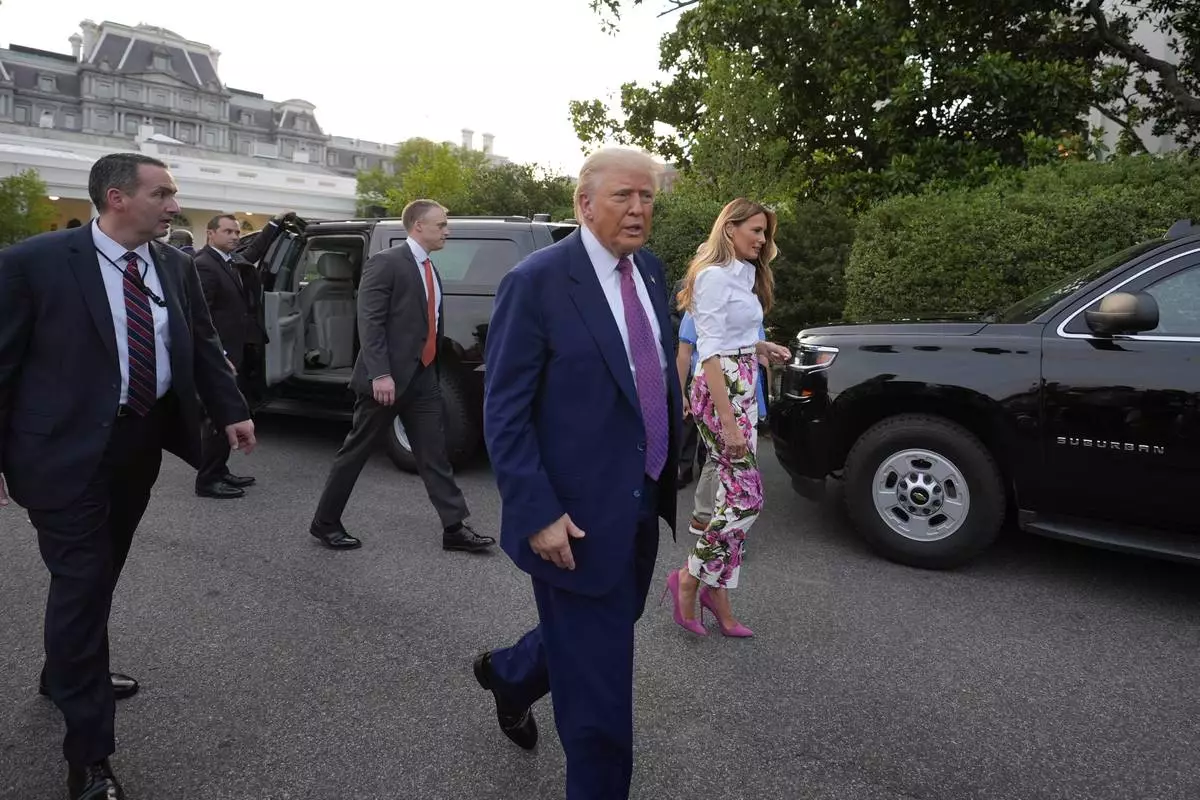
President Donald Trump and first lady Melania Trump walk after greeting guests during the congressional picnic on the South Lawn of the White House, Thursday, June 12, 2025, in Washington. (AP Photo/Alex Brandon)
The Golden Globes bill themselves as Hollywood’s booziest bash. This year, is anyone ready to party?
Political tension and industrywide uncertainty are the prevailing moods heading into Sunday night's 83rd Golden Globes. Hollywood is coming off a disappointing box-office year and now anxiously awaits the fate of one of its most storied studios, Warner Bros.
A celebratory mood might be even more elusive given that the wide majority of the performers and filmmakers congregating at the Beverly Hilton in Beverly Hills, California, oppose the policies of President Donald Trump. Likely to be on the minds of many attendees: the recent U.S. involvement in Venezuela and the fatal shooting of 37-year-old mother Renee Good in Minneapolis by Immigration and Customs Enforcement.
But through their ups and downs, the Globes have always tried to put pomp over politics. Host Nikki Glaser has vowed as much.
“You’d be surprised that half the room had no clue why I was saying ‘Venezuela,’” Glaser told The Associated Press earlier in the week, referring to her comedy-club warm-ups. “People aren’t getting the news like we all are.”
Glaser, a comic known for her roast appearances, has promised to go after A-listers in her second time hosting.
“We’re going to hit Leo,” Glaser said. “The icebergs are coming.”
Here’s what to look for at this year’s Globes:
The Golden Globes kick off at 8 p.m. EST on CBS while streaming live for Paramount+ premium subscribers. E!’s red carpet coverage begins at 6 p.m. EST.
The Associated Press will be have a livestream show beginning at 4:30 p.m. Eastern with a mix of stars' arrivals, fashion shots and celebrity interviews. It will be available on YouTube and APNews.
The overwhelming Oscar favorite “One Battle After Another” comes in with a leading nine nominations. It’s competing in the Globes’ musical or comedy category, which means the drama side might be more competitive. There, Ryan Coogler’s “Sinners,” Chloé Zhao’s “Hamnet” and Joachim Trier’s “Sentimental Value” are all in the mix.
But thus far, “One Battle After Another” has cleaned up just about everywhere. Much of Paul Thomas Anderson’s cast is nominated, including DiCaprio, Teyana Taylor, Sean Penn, Chase Infiniti and Benicio Del Toro.
If it and “Sinners” take home the two biggest prizes, it will be a banner night for Warner Bros. even as its future hangs in the balance. The studio has agreed to be acquired by Netflix is a deal worth $82.7 billion. Movie theaters have warned such a result would be “a direct and irreversible negative impact on movie theaters around the world.”
The merger awaits regulatory approval, while Paramount Skydance is still trying to convince Warner shareholders to accept its rival offer.
After an audacious promotional tour for “Marty Supreme,” Timothée Chalamet is poised to win his first Globe in five nominations. In best actor, comedy or musical, he’ll have to beat DiCaprio, a three-time Globe winner, and Ethan Hawke (“Blue Moon”).
In best actress, comedy or musical, Rose Byrne is the favorite for her performance in the not especially funny A24 indie “If I Had Legs I’d Kick You.” One prominent nominee in the category, Cynthia Erivo (“Wicked: For Good”), won’t be attending due to her schedule in the West End production “Dracula.”
Jessie Buckley (“Hamnet”) is the clear front-runner in best actress, drama. In the star-studded best actor, drama, category, the Brazilian actor Wagner Moura (“The Secret Agent”) may win over Michael B. Jordan (“Sinners”) and Joel Edgerton (“Train Dreams”).
In the supporting categories, Teyana Taylor and Stellan Skarsgård come in the favorites.
The Globes, formerly presented by the Hollywood Foreign Press Association, have no overlap or direct correlation with the Academy Awards. After being sold in 2023 to Todd Boehly’s Eldridge Industries and Dick Clark Productions, a part of Penske Media, the Globes are voted on by around 400 people. The Oscars are voted on by more than 10,500 professionals.
But in the fluctuating undulations of awards season, a good speech at the Globes can really boost an Oscar campaign. Last year, that seemed to be the case for Demi Moore, who won for “The Substance” and gave the night's most emotional speech. Mikey Madison (“Anora”), however, scored the upset win at the Oscars.
A few potentially good moments this year went instead in a Golden Eve ceremony earlier this week. There, the Cecil B. DeMille and Carol Burnett honorees, Helen Mirren and Sarah Jessica Parker, accepted their awards.
One to watch, if he wins, will be the Iranian director Jafar Panahi. His revenge drama “It Was Just an Accident” is up for four awards. Panahi has spent most of his career making films clandestinely, without approval of authorities, and was until recently banned from leaving the country. Last month, he was sentenced to a year in prison, which would be only his latest stint behind bars if Panahi returns home to serve it. This week, protests over Iran’s ailing economy have spread throughout the country in a new test to Iran's leaders.
For the first time, the Globes are trotting out a new podcast category. The nominees are: “Armchair Expert,” “Call Her Daddy,” “Good Hang With Amy Poehler,” “The Mel Robbins Podcast,” “SmartLess” and “Up First.”
In TV, HBO Max’s “The White Lotus” — another potential big winner for Warner Bros. — leads with six nominations. Netflix’s “Adolescence” comes in with five nods.
But the most closely watched nominee might be “The Studio.” The first season of Seth Rogen’s Hollywood satire memorably included an episode devoted to drama around a night at the Globes. (Sample line: “I remember when the red carpet of the Golden Globes actually stood for something.”) “The Studio” is up for three awards, giving three chances for life to imitate art.
For more coverage of this year’s Golden Globe Awards, visit: https://apnews.com/hub/golden-globe-awards

Teyana Taylor arrives at the 83rd Golden Globes on Sunday, Jan. 11, 2026, at the Beverly Hilton in Beverly Hills, Calif. (Photo by Richard Shotwell/Invision/AP)

Stellan Skarsgård, left, and Megan Everett-Skarsgard arrive at the 83rd Golden Globes on Sunday, Jan. 11, 2026, at the Beverly Hilton in Beverly Hills, Calif. (Photo by Jordan Strauss/Invision/AP)

Colman Domingo arrives at the 83rd Golden Globes on Sunday, Jan. 11, 2026, at the Beverly Hilton in Beverly Hills, Calif. (Photo by Jordan Strauss/Invision/AP)

Selena Gomez arrives at the 83rd Golden Globes on Sunday, Jan. 11, 2026, at the Beverly Hilton in Beverly Hills, Calif. (Photo by Jordan Strauss/Invision/AP)

Nikki Glaser arrives at the 83rd Golden Globes on Sunday, Jan. 11, 2026, at the Beverly Hilton in Beverly Hills, Calif. (Photo by Jordan Strauss/Invision/AP)

Maura Higgins, from ledt, Gayle King, and Mona Kosar Abdi arrive at the 83rd Golden Globes on Sunday, Jan. 11, 2026, at the Beverly Hilton in Beverly Hills, Calif. (Photo by Jordan Strauss/Invision/AP)

Derek Hough arrives at the 83rd Golden Globes on Sunday, Jan. 11, 2026, at the Beverly Hilton in Beverly Hills, Calif. (Photo by Jordan Strauss/Invision/AP)

Tessa Thompson arrives at the Golden Globes Golden Eve on Tuesday, Jan. 6, 2026, at The Beverly Hilton Hotel, in Beverly Hills, Calif. (Photo by Jordan Strauss/Invision/AP)

Nikki Glaser rolls out the red carpet during the 83rd Golden Globes press preview on Thursday, Jan. 8, 2026, at the Beverly Hilton in Beverly Hills, Calif. (AP Photo/Chris Pizzello)






